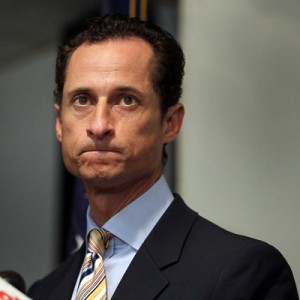Should Humanists Care About (Yet Another) Anthony Weiner Scandal?

Is a politician’s sex life the business of the public? Do we have a right to judge someone based on their private affairs? Mallory Kruper explains why the public cares so much about New York mayoral candidate Anthony Weiner’s sexting scandals.
Anthony Weiner just can’t seem to stay out of the spotlight, and not in a good way. After resigning from Congress in 2011 after a “sexting” scandal, the New York City mayoral candidate is back in the papers for yet another scandal. The media cannot seem to get enough, and the story has been reviewed from almost every angle, from feminists analyzing Weiner’s wife Huma Abedin’s choice to stand by her husband, to psychologists who use the story to discuss the issue of sex addiction. But as humanists, why should we care?
The simple answer: we shouldn’t. If this were any regular person walking down the street, we would not care and, even more likely, would not really want to know if they were sending inappropriate photos, so long as the recipient actually consented to receiving them. However, the complicated answer is that Weiner is not just another regular person walking down the street, and definitely was not when he was in Congress. In many ways our country cares far too much about politicians’ personal lives, holding them to much higher standards than we would any other person, including ourselves. It would make more sense to treat politicians they same way we treat any other business employees. If they are doing their job well and getting work accomplished for their constituents, there is really no reason to care what they do in their personal time, as long as it does not interfere with their work.
The problem with Anthony Weiner is that his scandals were not limited to his personal time. Several pictures were sent using his official Twitter account, and at least one picture was sent to someone without her consent. He also lied to the press for several days in 2011 when pictures first appeared on his Twitter account and supposedly spent thousands of dollars unnecessarily investigating the issue. It would be easy to look at this and say that it shows how Weiner lacks respect for women, how his values are clearly not what his constituents thought they were, how his actions reflect his poor judgment, and that he was therefore right to resign and should not be running for mayor. However, this is not the most rational way to look at this.
If any other business employee were caught doing what Weiner was, under exactly the same circumstances, he would be most likely fired. Maybe after several years of taking time with his family, and trying to improve himself, his former employer might be willing to give him a second chance, maybe. This was Anthony Weiner entering the mayoral race in New York City, trying to earn back the trust and respect of New Yorkers, his metaphoric bosses. As a state representative and House Representative, he had been, what many consider, a good politician, always willing to fight for his constituents. Maybe he could still be an asset to the company that is New York City and deserves a second chance. Unfortunately, Weiner had learned from his previous mistakes and was caught in a similar situation. Aside from the sexting, he also had a former intern come forward about her experiences in his offices, claiming that he called her and other female interns ‘Monica.’ While this isn’t the worst thing a politician has ever done, it does cast doubt in our minds as to whether he is the best person for the job.
But at the end of the day, it’s not up to me, or the media, or anyone who is not a registered voter in New York City as to whether Weiner gets a second (or really third) chance. It’s up to his constituents—his employers—to decide if, flaws and scandals included, he can do what is best for the city and for them. I just hope that on election day, they will make the most rational decision possible.
